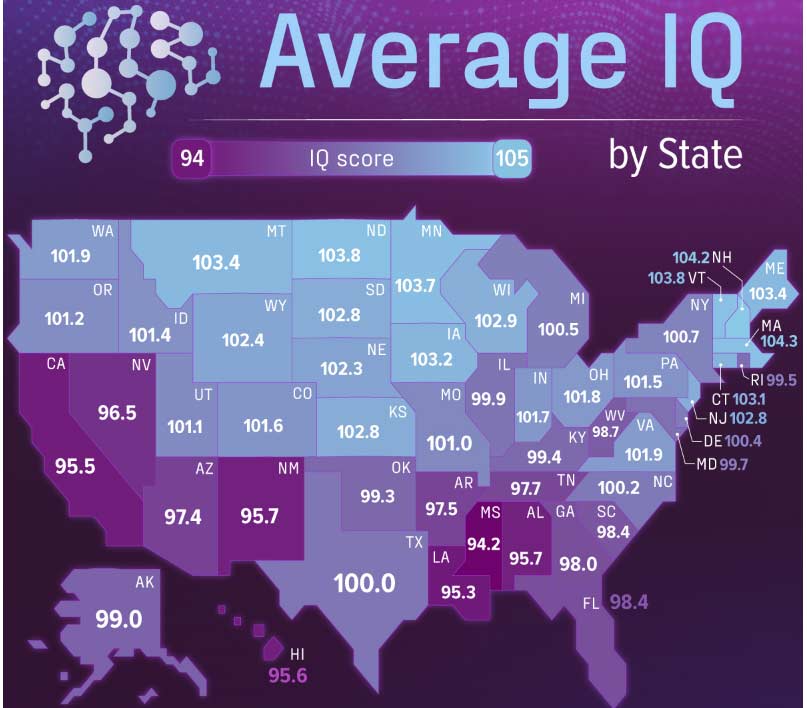
- IQ Test
- All Tests
- IQ Practice Test
- IQ Challenges
- Result Sample
Most of the population scores within the average IQ score range, while just approximately 2% can be labeled as “very superior” (those with scores above 130 IQ) or borderline impaired (those with scores under 70). So, what scores are considered "average,” and what is the average IQ score in the U.S.? Find out here in today’s blog post.
The intelligence quotient, aka IQ, is a measure of an individual's ability to reason, solve problems, and process information in relation to their peer group.
The average IQ score is typically set at 100, a reference point, a baseline, or a benchmark for comparing individuals’ cognitive skills within the general population. In fact, most people (around 68%) score within one standard deviation of the mean, or between 85 and 115. Look at the bell curve below to better understand how IQ scores are distributed.
On the Stanford-Binet test, the Wechsler Adult Intelligence Scale, and other IQ assessments, scores between 90 and 109 are also considered average. Here’s a look at the average IQ classifications of common versions of IQ tests:
IQ tests | Average IQ score ranges | ||
Low Average | Average | High Average | |
Wechsler Intelligence Scale | 80-89 | 90-109 | 110-119 |
Stanford-Binet Fifth Edition | 80-89 | 90-109 | 110-119 |
The Woodcock-Johnson Test | 80-89 | 90-110 | 111-120 |
Cognitive Assessment System | 80-89 | 90-109 | 110-119 |
Kaufman Assessment Battery for Children | 85-115 | ||
IQ scores can vary significantly across different age groups. The following table shows you the average or normal IQ scores by age:
Age groups | Average IQ Score |
|---|---|
16-17 | 108 |
18-19 | 105 |
20-24 | 99 |
25-34 | 97 |
35-44 | 101 |
45-54 | 106 |
55-64 | 109 |
65-69 | 114 |
70-74 | 119 |
Source: MedicineNet.com
As you can see, the average IQ score begins at a relatively high 108 for ages 16-17 and tends to decline from ages 24-34 before seeing a slight increase in the age range of 35-44 and higher average scores from age 45 onward. However, it’s vital to note that these are average scores, and individual IQ can vary significantly. Also, while IQ may fluctuate with age, other factors, such as education, health, socioeconomic status, and more, can influence IQ scores.
Similar to age groups, the average IQ also varies from country to country. A 2019 study by researchers at the Ulster Institute evaluated average IQ scores globally using standard IQ tests along with additional measurements, like science, math, and reading assessments.
The findings revealed that more developed nations with more advanced educational systems are likely to have higher average IQ scores compared to less developed countries. Japan topped global rankings with an average IQ of 106.48, closely followed by Taiwan at 106.47 and Singapore at 105.79. The United States ranked 31st with an average IQ of 97.
Another key factor in assessing national intelligence is the “Intelligence Capital Index” (ICI)," which considers factors such as creativity, educational environment, and ability to attract talent. Interestingly, a country with a lower average IQ might still score high on the ICI. For example, the United States, despite its 31st rank in average IQ, tops the ICI list, followed by the United Kingdom and Germany.
The average IQ score in the U.S. is 97.43, as per The Intelligence of the Nations report by Richard Lynn and David Becker published in 2019. This result was calculated using different IQ test versions and detailed sample data regarding environmental and socioeconomic factors.

Average IQ in the U.S. by State (Source: Pesta B. J. (2022). Updated IQ Updated IQ and Well-Being Scores for the 50 U.S. States. Journal of Intelligence. Image Cre: VisualCalpitalist.com)
Also, according to the Updated IQ and Well-Being Scores for the 50 U.S. States by Bryan J. Pesta published in 2022, New Hampshire ranks first with the IQ score of 103.2, followed by Massachusetts and Minnesota, with 103.1 and 102.9, respectively. Some other states with IQs above 100 include Connecticut (101.2), Iowa (101.1), Kansas (100.5), Minnesota (102.9), Nebraska (101.2), New Jersey (101), Wisconsin (101.2), Wyoming (101.7), Washington (101.5), etc.
A good IQ score is generally considered to be above 100, with scores between 110 and 119 classified as "high average" and scores of 120 IQ and above considered "superior" or "gifted."
Yes. While IQ scores are generally stable, activities that enhance focus, memory, and reasoning—like puzzles, reading more, learning a new language, learning new skills (learning a sport or music), and maintaining good health—may contribute to cognitive improvement and enhanced IQ scores.
Research shows no significant difference in average IQ between men and women. Both genders score similarly overall, though a slightly higher number of girls cluster around the average, while boys tend to be more represented at both the high and low extremes.
To summarize, average IQ ranges from 90 to 109, and up to approximately 68% of people score between 85 and 115. In fact, the average IQ varies by age and from country to country. However, IQ is just one measure of intelligence and does not tell the whole story. Many factors like curiosity, emotional intelligence, creativity, and more also contribute to a person’s capabilities and success in life.